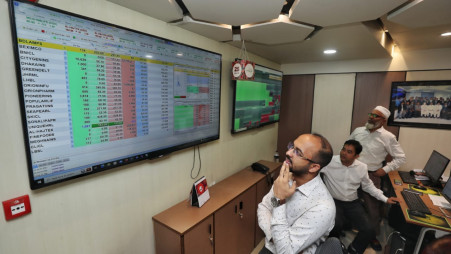Dhaka stocks hit 33-month low, key index dips below 6,000 points

The benchmark index of the Dhaka Stock Exchange (DSE) fell below 6,000 points to a 33-month low yesterday, extending the bearish trend for five consecutive sessions.
The key index, DSEX, settled at 5,974 after losing 32 points yesterday, resulting in a total erosion of 192 points over the five days.
Following Wednesday's fall, the market capitalisation of the DSE fell by Tk19,689 crore, settling at Tk7.32 lakh crore.
Market insiders say the removal of the floor price, coupled with ongoing regulatory conflicts, unstable policymaking, and a liquidity shortage due to higher interest rates, has exerted pressure on investors. The pressure has led investors to offload their holdings in an effort to safeguard funds from further erosion, they say.
EBL Securities in its daily market commentary said the downbeat vibe in the country's capital market extended further, with the benchmark index of the capital bourse falling to a nearly 3-year low, owing to persistent selling pressure as risk-averse investors continue to trim their exposure to capital market investments due to dwindling confidence across the trading floor.
The relentless bearish spell has been prolonged for continuous sessions as wary investors continued their selling spree to protect their funds from the ailing market, it added.
Expressing concern, Saiful Islam, president of the DSE Brokers Association of Bangladesh (DBA), said the DSE itself serves as a primary regulator for the stock market. He emphasised that when there is a disruption in coordination between the two regulators in performing their duties, investors become confused, leading to adverse effects on the capital market.
Recently, investors have been grappling with confusion stemming from decisions regarding the downgrading of stocks to the Z category and the withdrawal of floor prices, he said. "While category downgrading is typically within the purview of the stock exchanges, the Bangladesh Securities and Exchange Commission (BSEC) often interferes in these matters, adding to the uncertainty in the market."
Furthermore, confusion has been aggravated by discrepancies between the trading schedule set by the DSE for the month of Ramadan and subsequent changes made by the BSEC, he said.
Officials of the DSE said that no regulatory body in the world decides when to trade in the stock exchange.
"On 7 March, the DSE reduced the transaction time by one hour from 10am to 1:30pm for the convenience of fasting Muslims. The BSEC changed the decision and reduced it to only 20 minutes from 9:30 am to 1:40 pm. It is said that the reason for such intervention of the commission is that if the transaction time is reduced, the transaction amount will also decrease," said an official.
DSE officials say that setting the transaction time half an hour ahead of 9:30am is a problem and similarly it is a challenge to open the entire system within half an hour after the office opens at 9am.
An official, however, said, "Trading timing is a very small issue in the stock market. Regulatory bodies are interfering with much bigger issues than this. In fact, the stock exchange has no power at all."
Saiful Islam said any form of intervention disrupts the market equilibrium, ultimately harming investors.
Meanwhile, several top officers from brokerage firms claimed that the market is facing a liquidity shortage due to higher interest rates.
The DBA president said, "We have an interest rate of over 11% on treasury bonds here. In line with this, banks and non-bank financial institutions are also increasing interest rates. In such a situation, money goes out of the stock market and goes to deposits in all countries of the world. We are no exception.
"Investors are now turning to deposits to stay risk-free. Moreover, there is no supply of good shares to attract investors, nor is there any effort," he said.
He also said that last year most of the companies paid low dividends. Besides, economic uncertainty increases the risk of investors, the DBA president said.
Meanwhile, trading activities remained sluggish as market turnover decreased by 14% to Tk483 crore yesterday as against Tk563 crore in the previous session on the DSE.
In terms of sectoral performance, engineering issues took the lead in turnover, contributing 16%, followed by the food and pharmaceutical sectors.
Lovello emerged as the most actively-traded stock with a turnover value of Tk24 crore, followed by Fu-Wang Ceramic and Golden Son.
Newly-listed Asiatic Laboratories secured the top position on the gainers' table as its share price jumped over 9%, followed by Rupali Life Insurance and Golden Son.
On the other hand, Karnaphuli Insurance, International Leasing and Regent Textile were the top losers.
The port city bourse, Chittagong Stock Exchange, also settled in the red terrain yesterday. The selected indices CSCX and All Share Price Index CASPI declined by 94 points and 157 points to settle at 10,271 and 17,105, respectively.


 Keep updated, follow The Business Standard's Google news channel
Keep updated, follow The Business Standard's Google news channel
















